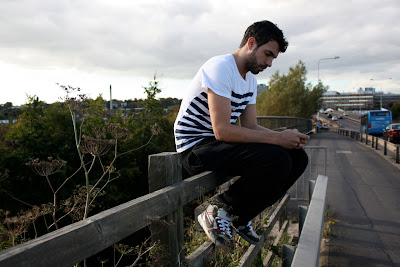Today's another day where I wish Ryan Gosling was my boyfriend. Or at least my friend.
Selasa, 11 Oktober 2011
Jumat, 07 Oktober 2011
some new music videos
Beyonce - "Countdown"
Shine 2009 - "New Rules"
Wilco - "Born Alone"
Adventure - "Rio"
Kamis, 06 Oktober 2011
louis vuitton
Marc Jacobs infused flowers and lace into this delicately beautiful Louis Vuitton Spring 2012 collection.

Senin, 03 Oktober 2011
something spontaneous: an interview with andrew haigh
Writer / Director Andrew Haigh's intricate new film Weekend explores the tension and romance that arises between two men. For me, it was one of the most authentic films about the gay experience I've seen in some time.
Haigh took the time to answer a few questions about the making of the film.
Because the film feels so natural and lived-in, I was interested in your process of writing the script. Was there a lot of room for improvisation?
AH: I spent a long time working on the script, trying to make it feel as real as possible, make it sound like actual dialogue rather than script talk. Then when we got to shooting the film, I always left room for improvisation. I would sit down with the actors each night and we would go through the script, taking out what didn't work, adding things we felt necessary. And then during shooting, we would continue this method. If the actors wanted to add things, then they did and if they wanted to take things away, they did that also. I was always looking for something spontaneous.

I love the intimacy, subtlety and depth in the performances of Tom Cullen and Chris New. How did you decide to work with these two actors?
AH: We did a very traditional casting process but I was just desperate to find two people with a spark and a chemistry otherwise the film would be dead in the water. These two guys had something the minute I put them in a room together and I knew they would be perfect.
You have a background in editing Hollywood movies. Is there anything you'd like to see more (or less) of in mainstream cinema these days?
AH: Lots of things. I'd like to see stories that reflect the lives of real people. I'd like to see smaller stories about the struggles we all face. I'd like to see more experimentation. I'd like to see a lot less cutting and editing that's for sure. I love films with space. I don't want films forced down my throat.
What's your favorite film era?
AH: Like most people I would say 1970's American cinema. It was just an incredible time for movies.
Are there any films or literary works that influenced the style or substance of Weekend?
AH: Lots of films. Old Joy, Goodbye Solo, Nights and Weekends, Saturday Night and Sunday Morning, My Night with Maud, Usak. There is an endless list. In times of literature, I would say Camus and Sartre and other existential fiction.
I was curious what it was like to work with the cinematographer Urszula Pontikos. Did she add anything to your vision and what was the collaborative process like with her? I loved many of the film's shots and long takes.
AH: She was great. She has a tenderness in the way she shoots that was exactly what I needed for the film and we would always discuss our choices before each shot. In terms of the long takes, that was always something I planned on from the beginning, even when writing the script. A few people thought it was risky but I like a risk.
The final shot and song over the end credits were particularly moving. How did you find music for the picture?
AH: The music is by John Grant, who is an American musician. He's pretty big in the UK but strangely not so much in the US. I basically stalked him and hunted him down, made him have coffee with me and persuaded him to give me the track for very little.
What are some of your favorite films of the year so far?
AH: A small British film called Self Made. I liked Joe Swanberg's Silver Bullets, Michael Tully's Septien and Bridesmaids. I loved Bridesmaids. A woman taking a shit in the street in a wedding dress should be in every film ever made.
Sabtu, 01 Oktober 2011
Jumat, 30 September 2011
take shelter

Take Shelter by writer / director Jeff Nichols is a cinematic attempt at capturing these uneasy American times by focusing on the mental deterioration (or just psychic apocalyptic visions?) of a blue collar Ohio construction worker named Curtis (played by Michael Shannon). His wife Samantha (Jessica Chastain) has a small needlework business. Both are trying to make ends meet and are caring for their young hearing impaired daughter (Tova Stewart). Curtis becomes increasingly paranoid from violent, unsettling dreams and hallucinations which leads him to curious decisions like taking out a lavish bank loan to build a fallout shelter in the backyard. Because his mother (Kathy Baker) suffered from schizophrenia, Curtis is worried this may be happening to him as well. The movie clumsily juggles between being a serious movie about mental illness and an almost-horror movie (CGI flocks of birds) about paranoia of fantastical doom.
While Nichols shows some visual flair, the film is a study in bland America. The dream sequences are the best assets--including a great shot of a dripping-wet Chastain about to pick up a knife--but all of them become increasingly repetitive. What ends up being the scariest aspects of the movie are the struggles of everyday life: insurance, gas prices, losing work. They are reminders of what most of us have to go back to after leaving this picture. Shannon is certainly believable but I felt a bit detached from his performance, especially in a calculated, overwrought meltdown scene. Detached would describe Chastain's character who doesn't respond with much urgency to her husband's bizarre behavior. Both are interesting actors and do the best they can with the stilted material. In a minuscule part as a therapist, I found Lisa Gay Hamilton to be the most authentic and a breath of fresh air. The film has some relation to Polanski's vivid Repulsion, Aronofksy's Black Swan and Steven Spielberg's epic Close Encounters of the Third Kind where an every man goes to great, odd lengths to get to the bottom of his obsessive visions. And while there's much to admire with what Nichols can do on a small budget, for a two hour film about dread, it doesn't offer much thrill. There is little going on with the soundtrack (the sparse score is derivative) and it arrives at a frustratingly weak conclusion. Disappointingly it ends up being too restrained, an overlong Twilight Zone episode, almost Shyamalan-lite.
Kamis, 29 September 2011
Rabu, 28 September 2011
weekend
Here are some beautiful stills by Quinnford + Scout from the lovely new film Weekend.
I have a crush on Tom Cullen.
Read my review here.
I have a crush on Tom Cullen.
Read my review here.
Senin, 26 September 2011
"have you ever been properly alone?"
Weekend feels like the first gay movie that never hits a false note and that is no small feat. It's the antithesis of all the bright-eyed (and brightly-lit) romances (there's an obvious dig to Notting Hill) and of gay films where sex and romance are portrayed as fulfilling and sustaining. Tom Cullen plays the reticent Russell, a lifeguard, whose existence is summed up in one of the film's incredibly precise shots: him standing alone at the edge of the pool, uneasy and bored, a clock ticking above his head. Russell meets Glen (Chris New) at the local gay bar (amusingly named Propaganda) and takes him home. Instead of having the usual one night stand, Russell and Glen hit it off and the two share an intimate weekend. The characters are full of contradictions: Russell likes old things, like his hodgepodge of second hand teacups but he likes his new kicks. He's closeted to many around him but persuades Glen to ride on his bike with him in the middle of the street. Glen is outspoken, forceful, quite loquacious about his sexual escapades (he records the tales of his sexual partners as a sort of artistic project... though the reason for that becomes somewhat ambivalent by the film's end) and he's not a fan of gay marriage ("...it feeds into the system").
The intimacy between the two is very involving and sensitively played. It helps that they aren't generic stereotypes or typical generic beauties. The inherent differences between the two can also speak, intentional or not, of larger frictions within the gay community at this moment in time. The long takes, somewhat off-kilter hand-held shots (framing from behind a fence or between train seats or above from a 14th floor window), dull dialogue, banal settings (the obnoxiously noisy bars, Russell's bland concrete apartment complex) illustrate a sort of urban angst. There isn't the philosophical banter in the golden-hued Before Sunrise and Before Sunset and there are no veiled daggers as in Who's Afraid of Virginia Woolf? and Sunday Bloody Sunday, (films which seem like influences on, or at least comrades with Weekend). The climax occurs during a coke-fueled argument which brings about their insecurities and painful realizations. The movie wanders languidly but arrives at an ending that's quietly haunting. It isn't a cinematic journey I'm eager to repeat though overall I deeply cherish how Haigh's film deals with the uneasiness of being gay in a way I don't think any film I've seen before has been able to communicate. Hopefully there will be more as good as this to follow.
-Jeffery Berg
'drive' soundtrack review
I'm still addicted to the music from this movie. Check out my music review for the Drive soundtrack on Frontier Psychiatrist.
And my review of the film is here.
Langganan:
Postingan (Atom)






































